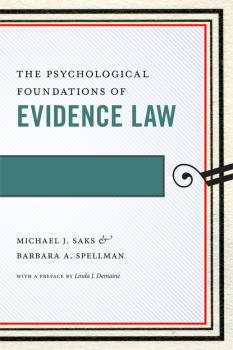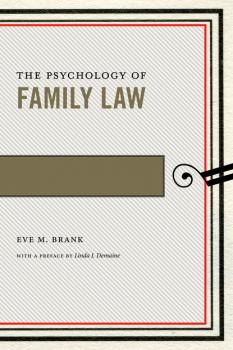ТОП просматриваемых книг сайта:
Psychology and the Law
Скачать книги из серии Psychology and the LawАннотация
Offers psychological insights into how people perceive, respond to, value, and make decisions about the environment Environmental law may seem a strange space to seek insights from psychology. Psychology, after all, seeks to illuminate the interior of the human mind, while environmental law is fundamentally concerned with the exterior surroundings—the environment—in which people live.Yet psychology is a crucial, undervalued factor in how laws shape people’s interactions with the environment. Psychology can offer environmental law a rich, empirically informed account of why, when, and how people act in ways that affect the environment—which can then be used to more effectively pursue specific policy goals. When environmental law fails to incorporate insights from psychology, it risks misunderstanding and mispredicting human behaviors that may injure or otherwise affect the environment, and misprescribing legal tools to shape or mitigate those behaviors. The Psychology of Environmental Law provides key insights regarding how psychology can inform, explain, and improve how environmental law operates. It offers concrete analyses of the theoretical and practical payoffs in pollution control, ecosystem management, and climate change law and policy when psychological insights are taken into account.
Информация о книге
Автор произведения Arden Rowell
Жанр Юриспруденция, право
Серия Psychology and the Law
Аннотация
Considers how research in psychology offers new perspectives on property law, and suggests avenues of reform Property law governs the acquisition, use and transfer of resources. It resolves competing claims to property, provides legal rules for transactions, affords protection to property from interference by the state, and determines remedies for injury to property rights. In seeking to accomplish these goals, the law of property is concerned with human cognition and behavior. How do we allocate property, both initially and over time, and what factors determine the perceived fairness of those distributions? What social and psychological forces underlie determinations that certain uses of property are reasonable? What remedies do property owners prefer? The Psychology of Property Law explains how assumptions about human judgement, decision-making and behavior have shaped different property rules and examines to what extent these assumptions are supported by the research. Employing key findings from psychology, the book considers whether property law’s goals could be achieved more successfully with different rules. In addition, the book highlights property laws and conflicts that offer productive areas for further behaviorally-informed research. The book critically addresses several topics from property law for which psychology has a great deal to contribute. These include ownership and possession, legal protections for residential and personal property, takings of property by the state, redistribution through property law, real estate transactions, discrimination in housing and land use, and remedies for injury to property.
Информация о книге
Автор произведения Stephanie M. Stern
Жанр Общая психология
Серия Psychology and the Law
Аннотация
Tort law regulates most human activities: from driving a car to using consumer products to providing or receiving medical care. Injuries caused by dog bites, slips and falls, fender benders, bridge collapses, adverse reactions to a medication, bar fights, oil spills, and more all implicate the law of torts. The rules and procedures by which tort cases are resolved engage deeply-held intuitions about justice, causation, intentionality, and the obligations that we owe to one another. Tort rules and procedures also generate significant controversy—most visibly in political debates over tort reform. The Psychology of Tort Law explores tort law through the lens of psychological science. Drawing on a wealth of psychological research and their own experiences teaching and researching tort law, Jennifer K. Robbennolt and Valerie P. Hans examine the psychological assumptions that underlie doctrinal rules. They explore how tort law influences the behavior and decision-making of potential plaintiffs and defendants, examining how doctors and patients, drivers, manufacturers and purchasers of products, property owners, and others make decisions against the backdrop of tort law. They show how the judges and jurors who decide tort claims are influenced by psychological phenomena in deciding cases. And they reveal how plaintiffs, defendants, and their attorneys resolve tort disputes in the shadow of tort law. Robbennolt and Hans here shed fascinating light on the tort system, and on the psychological dynamics which undergird its functioning.
Информация о книге
Автор произведения Jennifer K. Robbennolt
Жанр Юриспруденция, право
Серия Psychology and the Law
Аннотация
Evidence law is meant to facilitate trials that are fair, accurate, and efficient, and that encourage and protect important societal values and relationships. In pursuit of these often-conflicting goals, common law judges and modern drafting committees have had to perform as amateur applied psychologists. Their task has required them to employ what they think they know about the ability and motivations of witnesses to perceive, store, and retrieve information; about the effects of the litigation process on testimony and other evidence; and about our capacity to comprehend and evaluate evidence. These are the same phenomena that cognitive and social psychologists systematically study. The rules of evidence have evolved to restrain lawyers from using the most robust weapons of influence, and to direct judges to exclude certain categories of information, limit it, or instruct juries on how to think about it. Evidence law regulates the form of questions lawyers may ask, filters expert testimony, requires witnesses to take oaths, and aims to give lawyers and factfinders the tools they need to assess witnesses’ reliability. But without a thorough grounding in psychology, is the “common sense” of the rulemakers as they create these rules always, or even usually, correct? And when it is not, how can the rules be fixed? Addressed to those in both law and psychology, The Psychological Foundations of Evidence Law draws on the best current psychological research-based knowledge to identify and evaluate the choices implicit in the rules of evidence, and to suggest alternatives that psychology reveals as better for accomplishing the law’s goals.
Информация о книге
Автор произведения Michael J. Saks
Жанр Юриспруденция, право
Серия Psychology and the Law
Аннотация
Bridges family law and current psychological research to shape understanding of legal doctrine and policy Family law encompasses legislation related to domestic relationships—marriages, parenthood, civil unions, guardianship, and more. No other area of law touches so closely to home, or is changing at such a rapid pace—in fact, family law is so dynamic precisely because it is inextricably intertwined with psychological issues such as human behavior, attitudes, and social norms. However, although psychology and family law may seem a natural partnership, both fields have much to learn from each other. Our laws often fail to take into account our empirical knowledge of psychology, falling back instead on faulty assumptions about human behavior. This book encourages our use of psychological research and methods to inform understandings of family law. It considers issues including child custody, intimate partner violence, marriage and divorce, and child and elder maltreatment. For each topic discussed, Eve Brank presents a case, statute, or legal principle that highlights the psychological issues involved, illuminating how psychological research either supports or opposes the legal principles in question, and placing particular emphasis on the areas that are still in need of further research. The volume identifies areas where psychology practice and research already have been or could be useful in molding legal doctrine and policy, and by providing psychology researchers with new ideas for legally relevant research.
Информация о книге
Автор произведения Eve M. Brank
Жанр Юриспруденция, право
Серия Psychology and the Law





